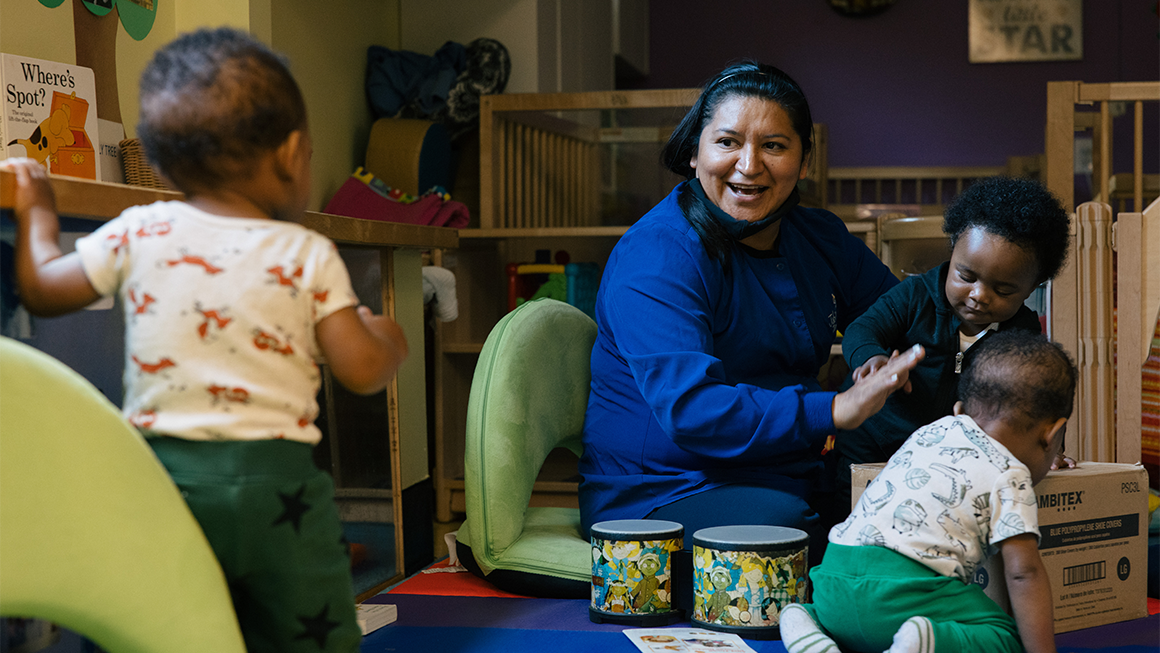
Despite earlier reports that DC mayor Muriel Bowser might cut funding for the Early Childhood Educator Pay Equity Fund, the mayor proposed continued funding for the program in her partial budget previewed last week.
A national model for how states and localities can address the child care crisis, the fund addresses low wages in the early childhood education workforce. Child care directors participating in the fund receive resources from the District to pay their educators minimum salaries that align with those of DC public school teachers. According to our analyses, the fund supports more than 3,600 early educators (PDF) who serve up to 19,300 children.
Amid DC’s ongoing budget uncertainty, continued investment in the fund will help child care centers attract educators and improve educators’ financial well-being. This makes educators less likely to leave their jobs and more likely to provide high-quality care. In turn, research shows stable, accessible child care can help families stay in the workforce and thrive economically. Together, the benefits of the fund advance Mayor Bowser’s goal of making Washington, DC, “a great place to live, work, and raise a family.”
In December and January, we interviewed 20 child care center directors at programs participating in the fund. Their experiences with the program highlight how the fund benefits not just educators but also children and families across DC.
The fund helps offset the cost of high-quality care for families and limit teacher turnover
Child care directors have committed to paying educators higher salaries set by the fund and rely on DC government support to do so. This support helps defray costs for families while retaining staff at their centers. As one director explained, “It’s not affordable to retain staff at that caliber without [the fund] and without creating a burden on parents who are already seeing high-dollar mortgage rates for child care.” The cost of child care in DC is well above the national average.
Research shows that when educators are appropriately compensated for their credentials, it can lead to lower staff turnover (PDF) and reduce the difficulties directors face when replacing qualified teachers (PDF). One director said the fund helps them avoid “losing some of our staff to DC Public Schools or [public] charter schools or other places that can actually compete and give them the salary that they need.”
The fund promotes family choice and access to care
At the start of fiscal year 2025, the fund supported most of DC’s child care supply. About 3 in 4 licensed DC child care programs participate in the fund, and 75 percent of all child care slots available in the District are offered by participating programs.
Several directors said if the fund didn’t continue in the upcoming fiscal year, their programs would have to close. When more programs remain open, families have more choices and can find child care that meets their needs. This helps parents stay employed and boosts children’s well-being, with long-term benefits for families and the broader economy.
Continued funding would maintain progress and rebuild trust
In December and January, most directors we interviewed were deeply concerned about whether the program would be around in the future. The fund was almost eliminated during the fiscal year 2025 budget cycle. Though it ultimately continued, its funding was reduced by 20 percent. Some directors thought the fund would likely be cut in the upcoming 2026 budget cycle.
“I feel like it’s gonna be every year, a fight,” said one director. “I don’t know how many years… I could handle that stress.”
Though continued funding for the program must be approved by the DC Council, the mayor’s budget proposal suggests it may not be a fight this year.
Still, the annual uncertainty around whether the fund will continue has eroded many child care directors’ and educators’ trust in the District. Directors said it was frustrating to rely on resources that could be seemingly taken away without warning. One director told us the fund’s sustainability “would always be up to the whim of what an administration’s interests are at that time.”
Restoring this trust is essential to the fund’s ability to support educators, businesses, and families in the long term. Child care directors and educators could better serve the District’s families if they feel like they can rely on the government to provide the resources appropriated under this legislation.
In turn, families need to trust they can access the child care they need without worrying that child care programs may close because of a sudden lack of resources. This illustrates how investing in early educators can contribute to a stronger, more stable child care system that supports families across the District.
Almost all directors we spoke with wanted the fund to continue. Given its many benefits, some expressed hope that other states would see DC as a model and implement similar programs to support their child care workforce and the families they serve. As one director told us, “I honestly never thought this would happen in my lifetime, and I’m so glad it did. I want it to keep going. I want it to happen everywhere in the world, not just here in DC. I want DC to be an example for everybody. It’s so great to be able to afford to do what you love to do.”
Let’s build a future where everyone, everywhere has the opportunity and power to thrive
Urban is more determined than ever to partner with changemakers to unlock opportunities that give people across the country a fair shot at reaching their fullest potential. Invest in Urban to power this type of work.